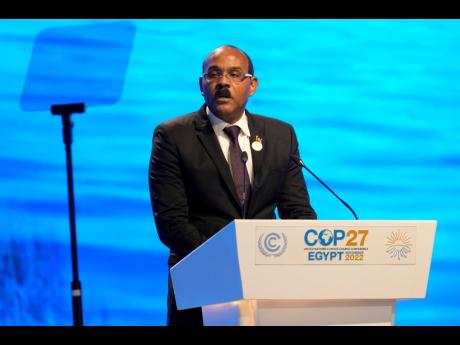You can now listen to Antigua News articles!

SOURCE: The Gleaner
In a significant display of humanity and personal courage, Gaston Browne, the prime minister of Antigua and Barbuda, recently struck a significant blow, even as he offered a gift on behalf of the people – and their families – who suffer from mental illness and the stigma and discrimination that often accompany their condition.
The Caribbean Community (CARICOM) should grasp and make full use of this gift.
At a church in St John’s, Antigua and Barbuda’s capital, Mr Browne gave a largely unvarnished, yet tender, eulogy to his mother in which he spoke about her struggle with an eventually “irreversible psychosis”; her spells in and out of Antigua’s psychiatric hospital (then popularly known as Crazy House); and of how her illness exacerbated his and his siblings’ extreme childhood poverty, although their mother, during her period of wellness, worked diligently and with honesty to provide for them. And there were, too, as is often the case with mentally ill people in the absence of support systems, the exploitation, including sexual, she suffered.
“I share these experiences of my mother … not to dwell in the past, not to lay blame at anyone, and I do so without any bitterness whatsoever,” Mr Browne said at her memorial service. “That experience, horrible though it was, occurred in a different time in our society’s understanding of tolerance.
“In our present-day society, this experience should serve as a means to cultivate a more empathetic and supportive environment for mentally ill persons. It should also summon the men in our nation to consider the psychosocial impact of their abuse and irresponsible behaviours towards women and children.”
For most individuals and families, Mr Browne’s opening up would have been an extraordinary exposure of an extremely sensitive, and mostly painful, period of their lives. The scabs may have been easily irritated.
However, given Gaston Browne’s position as head of government, his public highlighting of mental health and the challenges faced by people who suffer from it carries greater weight. More importantly, he has opened an opportunity for a larger regional discussion of the problem of the state of mental health and wellness in the Caribbean that ought not to be wasted.
Indeed, the timing is propitious. October 10 is the World Health Organization’s (WHO) World Mental Health Day.
CARICOM states should use that platform to launch the Pasty Richards Initiative (PRI) – named for Mr Browne’s mother – as a regional effort to confront problems affecting mental health in the Caribbean and to erase the stigma and discrimination surrounding mental illness.
The matter should be approached with a zeal similar to which the region is now attempting to attack non-communicable lifestyle diseases like obesity, hypertension and diabetes, and earlier efforts against HIV/AIDS.
The PRI should include in-depth reviews of the achievements by CARICOM members developing mental health action plans (2013-2030), in keeping with the WHO’s proposals, and how the region can combine its capacities to help those whose projects have become stuck.
Up-to-date data on the number of people in CARICOM states who live with mental health disorders, or the economic cost of mental illness in the region, are not readily available. Last October, the CARICOM Secretariat announced that it had commissioned, in conjunction with UNICEF, the United Nations children’s agency, a study on the state of mental health among young people in the community.
However, the accessible evidence suggests that, in many countries, and certainly in Jamaica, it is higher than the global average.
Based on WHO data, in 2019, before the onset of the COVID-19 pandemic, 970 million people, or around 13 per cent of the world’s population, experienced mental disorders of some kind. These issues were more prevalent among women (52.4 per cent) than men.












Truly a man of vision! Congratulations on behalf of all decent, positive and grateful Antiguans and Barbudans.